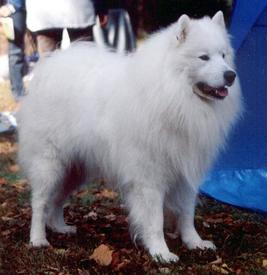
Utilised alongside the Samoyedic people of Siberia, the breed dates back to antiquity, being recognised as one of the 14 ancient breeds of the planet. Deriving its name from the people that originally developed it, primarily for the working purposes of herding, guarding and pulling sleds, the Samoyed established a shining reputation for itself as a bold and willing service dog, capable of working the harsh landscape for lengthy periods at a time. Popular amongst Siberian hunters and fishermen who valued the breed's keen energy and spirit, the Samoyed was versatile enough to take part in Arctic and Antarctic explorations, eventually making their way to England in 1889 with the explorer, Robert Scott. The Samoyed was officially recognised by the American Kennel Club in 1906.
Boasting a slightly larger frame than the German Spitz, or 'American Eskimo Dog' as it is sometimes known, the Samoyed is otherwise very similar in appearance and structure, possessing a proportioned body, straight legs, a distinctive tail curled over the back, high-set, triangular ears, and a profuse double coat. The coat is commonly seen in deviations of white, biscuit, yellow and cream - this would have served to insulate the dog from the desperate climates of Siberia, whilst protecting it from injury. Primitive in appearance, the Samoyed is often likened to a fox, although its temperament cannot be compared to one.
If you are looking for a fun-loving, animated and affectionate dog to complement your family, the Samoyed is the breed choice for you. Possessing an amiable and sweet-natured temperament with an added dash of mischief, the Samoyed is well suited to domestic life, providing its needs for exercise, human companionship and mental stimulation are met. Compatible with children and other house pets when introduced to them gradually, a Samoyed will never display signs of being unduly nervous or aggressive. On average, a healthy Samoyed will weigh 16-30 kg depending on its gender, with a life expectancy of 12-15 years when shown the appropriate love and care.
Typically healthy, resilient and long-lived, the Samoyed is not prone to any known genetic diseases. As with any breed, it might be susceptible to hip dysplasia, skin allergies and optical disorders, whilst diabetes is highly prevalent in the breed.








From West Yorkshire, United Kingdom
Beautiful breed but devil's in angels clothing lol. Be prepared for mischief and naughtiness in the nicest possible way. Owned samoyeds for 32 years....love them dearly but not for everyone. They are demanding and always have to be centre of attention. They are loyal faithful and loving . Can be exceptionally noisy ear piercing barks . Very gentle and sensitive....coats that if well looked after glisten in the sunshine....but it's not easy be prepared to brush daily. They moult heavily lots of hair. everywhere.